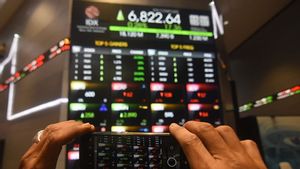JAKARTA - Bank Permata estimates that Indonesia's economic growth will slow down, but it will still be around 5 percent on an annual basis or year on year (yoy) in the second quarter of 2024.
Head of Bank Permata economist Josua Pardede said economic growth in the second quarter of 2024 is expected to slow down to around 5.02 percent (yoy), lower than the previous quarter of 5.11 percent.
"The growth (economic), which is still in the range of 5 percent, is mainly driven by domestic demand, which has remained relatively strong despite a decline in external demand," he explained to VOI, quoted Monday, August 5.
Josua said that the weakening of external demand was largely due to the slowdown in the global economy, especially China, the country with the second-largest economy in the world and Indonesia's main trading partner, where growth slowed significantly from 5.3 percent (yoy) in the first quarter of 2024 to 4.7 percent (yoy) in the second quarter of 2024. This condition had a negative impact on export performance.
However, Josua said domestic demand is also expected to slow down in the second quarter of 2024 due to several factors.
First, the shift in the month of Ramadan from the second quarter to the first quarter of this year could reduce household consumption growth in the second quarter, which usually spiked during this period.
"Given that household consumption contributes more than half of Indonesia's economy, this shift can have an impact on gross domestic product (GDP) as a whole," he said.
SEE ALSO:
Josua conveyed that the second is that government spending is expected to slow down significantly in line with the normalization of spending after the February 24, 2024 elections.
Furthermore, the third is that private investment is likely to remain weak, as shown by the declining manufacturing PMI.
According to Josua, this reflects a continuous wait and see approach among producers, driven by uncertainty over the new government's economic policy agenda and risks related to the global economic slowdown, and the impact stemming from the risk of a higher for longer policy interest rate by the Fed that led to the weakening of the Rupiah.
"We see that this is indeed hampering the business expansion plan," he concluded.
The English, Chinese, Japanese, Arabic, and French versions are automatically generated by the AI. So there may still be inaccuracies in translating, please always see Indonesian as our main language. (system supported by DigitalSiber.id)










